Arthur, Merlin and the fairies of the Breton cycle
The famous Polish science fiction writer Andrzej Sapkowski, assessing the influence of the legends of the Arturian (Breton) cycle on world literature, said:
Let's now talk a little about this legendary king.
King of knights
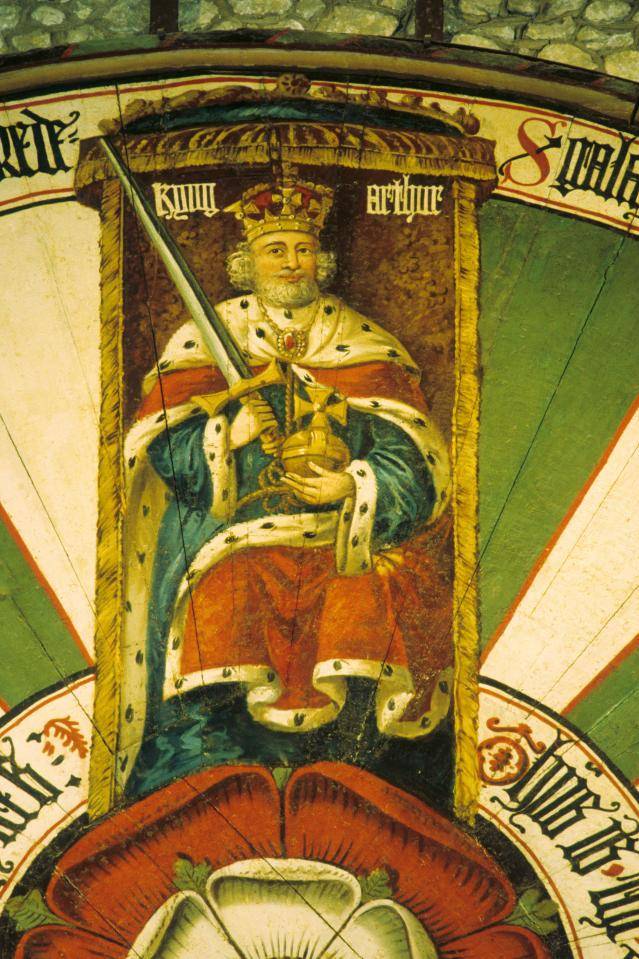
A painting of King Arthur in Winchester, Hampshire
For the first time the name of our hero appears in the ancient Welsh poem "Gododdin". According to the overwhelming majority of researchers, he was a Briton. Some historians believe that Arthur was of mixed Brito-Roman descent and was not a king, but one of the generals. Most likely, he led the cavalry units. The life of this hero is attributed to the end of the XNUMXth - beginning of the XNUMXth centuries. His opponents were the Germanic conquerors - the Angles and the Saxons, with whom he waged a stubborn war. The main site of the battles in which Arthur participated, most researchers consider the territory of modern Wales. However, there are supporters of the version according to which the prototype of the hero was the prefect Lucius Artorius Castus, who lived in the II century and enjoyed great authority in this Roman province. It is believed that over time, his image was mythologized. A fusion of images is also possible: the popularly popular leader of the Britons could be called "the second Artorius", and over time his real name was forgotten.
Researchers of medieval literature believe that at the archetypal level, Arthur of Celtic traditions is comparable to the legendary king of Northern Ireland Conchobar and to the Welsh god Bran. What is the meaning of his name?
According to one version, it is composed of two ancient Celtic words and means "Black Raven". In modern Welsh, the word for raven sounds like bran, which can serve as a confirmation of the connection between the images of Arthur and the god Bran.
However, another version is more popular. The point is that in historical Chronicles telling about the battle at Mount Badon (victorious battle for the Britons with the Angles), the name of the leader of the Britons is called Ursus. But ursus is a Latin word for bear. In the Celtic language, the bear is "artos". Galfried of Monmouth, who apparently knew both languages, could well have doubted the Latin name of the leader of the Britons and assumed that the authors who wrote in Latin literally translated the name of the hero from Gaelic. According to this version, Arthur is the British name given to the hero in honor of the totem animal.
In this article, in order to save the readers' time, I will not go into detail about the life and exploits of King Arthur of Celtic legends. They are well known to most of you, and there is little point in retelling them again. Literary sources are readily available, including in Russian. Those who wish will be able to get acquainted with them on their own. Let's talk about other heroes of the Arthurian cycle. And let's start with a story about the magician Merlin and two fairies - Morgan and Vivien (Lady of the Lake, Nimue, Ninev).
Merlin
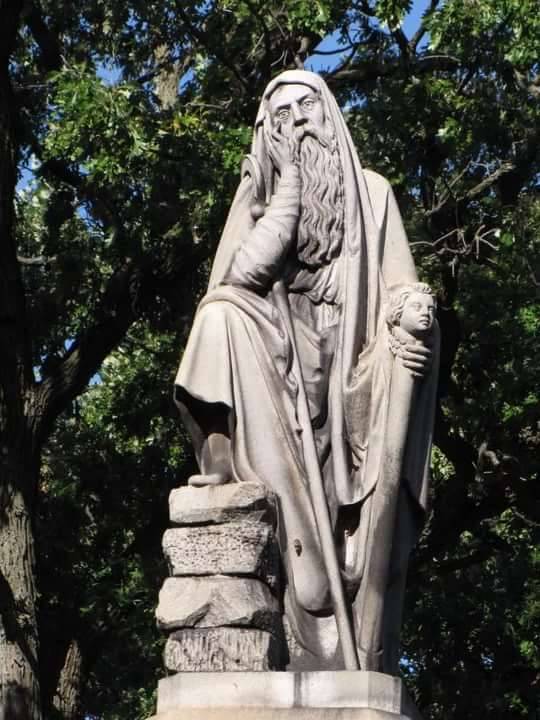
This sculptural image of Merlin can be seen in the suburb of Chicago - Forest Home Cemetery at Forest Park
The wizard Merlin, mentor and advisor to King Arthur, was known in Wales as Emrys (the Latinized form of this name is Ambrose).
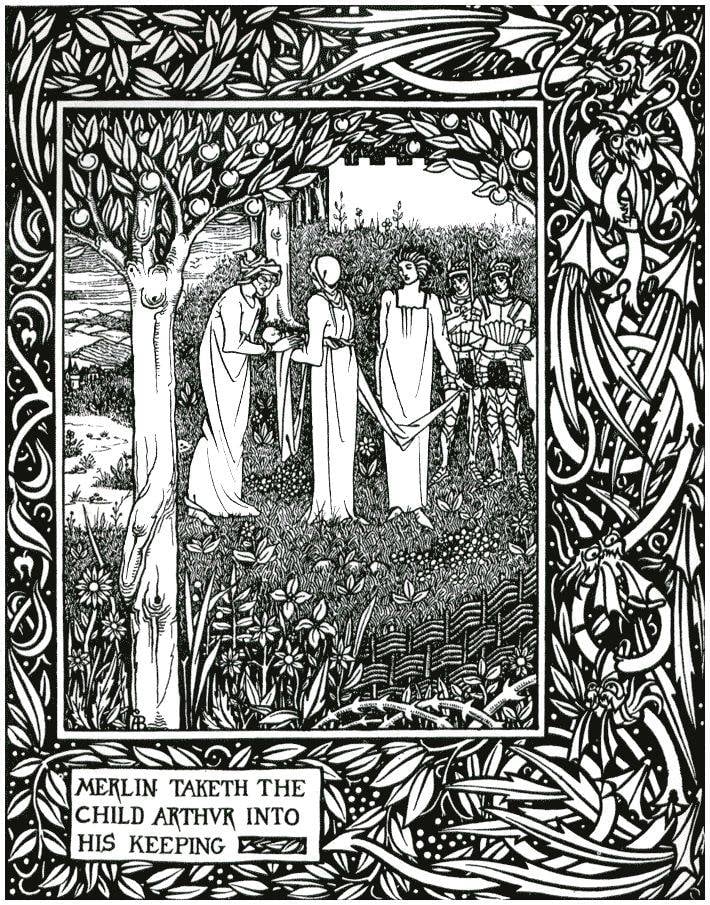
Aubrey Bbeardsley. Merlin takes baby Arthur
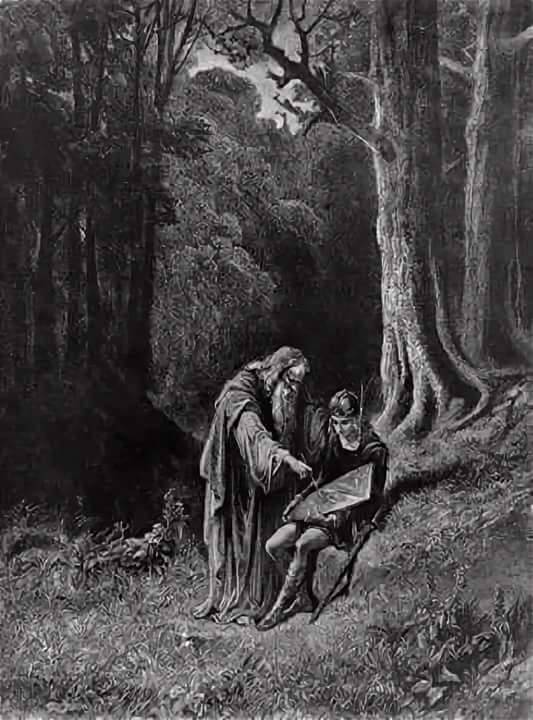
G. Dore. Merlin and young Arthur
It was with his name that the famous Stonehenge was associated here, the Welsh name of which is "The Work of Emrys".
Literally in February 2021, a site was found in Wales that coincided in diameter with the outer circle of Stonehenge. On it, stone pits were found, the shapes of which can be compared with the gray-blue columns of the English megalith. Moreover, the shape of one of the pits corresponds to a rather unusual cross-section of one of the stones of Stonehenge. There are cautious speculations that Stonehenge could have been built in Wales, and it was only a few hundred years later that its stones were transported to England as a trophy. It is curious that Galfried of Monmouth tells a similar story in The History of the Kings of Britain, and it is also associated with the name of Merlin. Only in it megalithic stones of a circle called "Dance of the Giants" were brought to England from Ireland by the order of this magician.
Many researchers believe that the Celtic bard Mirddin became the prototype for Merlin. Legends claimed that he lived many lives, preserving the memory of each of them. They believe that the name Mirddin was Latinized - Merlinus (this is the name of one of the falcon breeds).
Bard Taliesin calls Merlin by three names: Ann ap Lleian (Ann ap Lleian - Ann the son of a nun), Ambrose (Emmrys) and Merlin Ambrose (Merddin Emmrys).
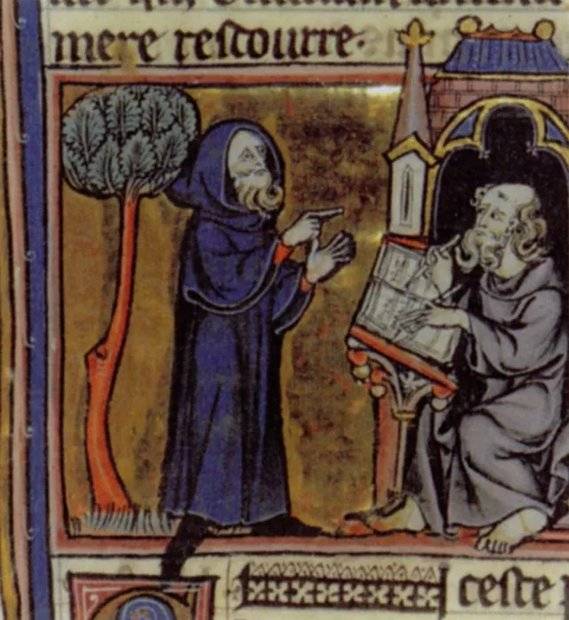
Merlin dictating his prophecies. Miniature from the manuscript of the novel "Merlin" by Robert de Boron (1300)
Since Merlin was credited with power over animals and birds, some researchers identify him with the forest god Cernunnos (Cernunnos).
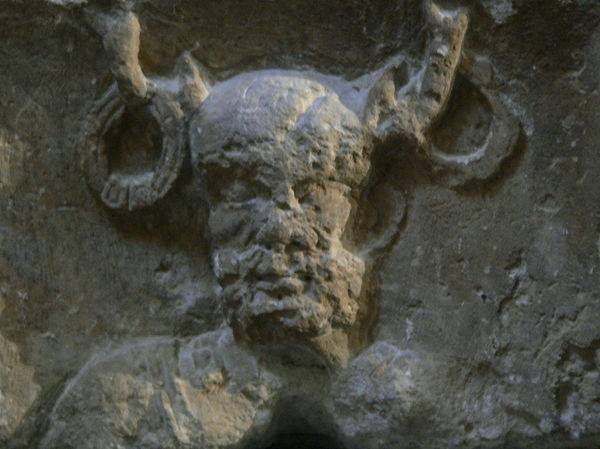
The horned celtic god Cernunnos
There are several versions of Merlin's origin. Some legends claim that he was born from a woman's relationship with the devil or an evil spirit, and at birth was covered with hair that came off after baptism (but magical abilities remained). There is a legend that the magician was the illegitimate son of a king who fell in love with a witch.
According to legend, after the death of Arthur, Merlin cursed his enemies - the Saxons. Some believed that it was because of this curse that the last Saka king Harold was defeated and killed at the Battle of Hastings (1066).
Merlin was ruined by his love. According to one version, he was imprisoned in a rock by the fairy Vivien, whom he vainly coveted. Another version claims that Merlin was immersed in eternal sleep by his other student, Morgana. We will now talk about these fairies.
Fata Morgana
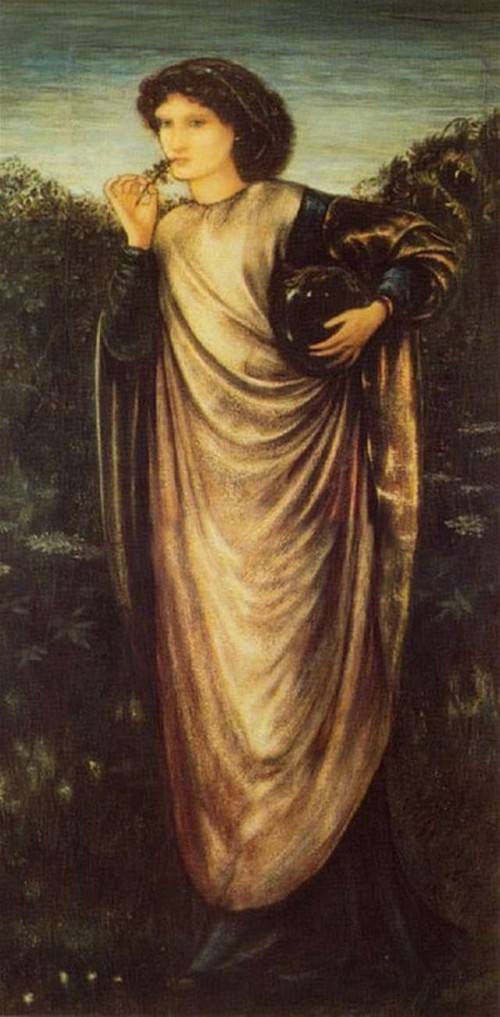
Edward Burne-Jones. Morgan Le Fay. 1862
The famous student of Merlin, the fairy Morgana, is associated with the Irish goddess of war Morrigan or with the Breton river fairy Morgan. Legends of the Breton cycle call her the daughter of the Duke of Cornwall and half-sister of Arthur, at whose insistence she entered into a political marriage with his former enemy, Urien of Gorsky. The couple did not love each other, and therefore, taking their newborn son, Morgana went to the Breton forest of Broceliande, where she became a student of Merlin who fell in love with her.
Thanks to Morgana, a Valley of no return appeared in Broceliande, and only a man could find a way out of it, never, even in his thoughts, who had not betrayed his beloved. Many unfaithful knights were freed from her later by Sir Lancelot.
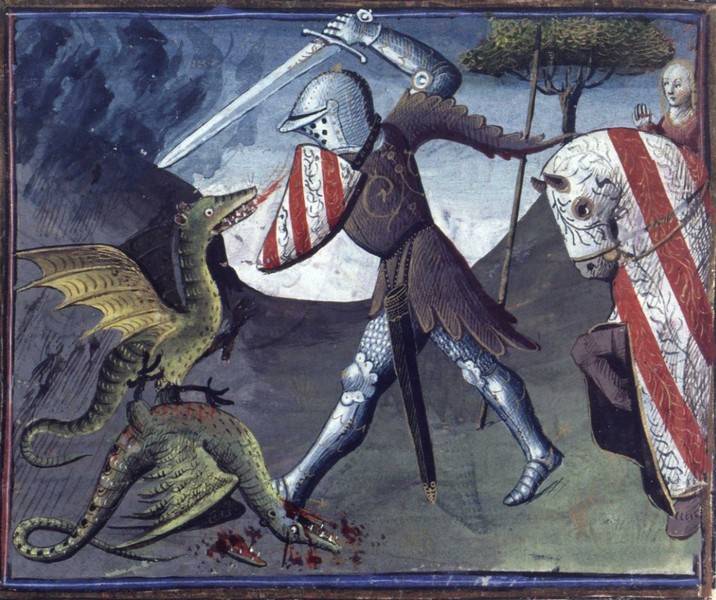
Lancelot fights two dragons guarding the entrance to the Valley of No Return, XNUMXth century
We'll talk more about Broceliande in the article "Stories with a Stone", but for now let's return to Morgan. She gave birth to three daughters from Merlin, to whom she gave the gift of healing. They also left offspring in which this gift was transmitted through the female line. Some noble English ladies, centuries later, were credited with the ability to make elixirs and balms, which are very effective in healing wounds. Sometimes the son of Morgana is called Mordred, but this is not true: this knight was born from the connection of Arthur and his sister Morgause, who was a pupil of Morgana.
Morgana was offended by Arthur for forcibly giving her in marriage. A powerful sister became the enemy of this king and tried to destroy him. Once she replaced the magic sword Excalibur with a copy, sent him poisoned clothes as a gift.
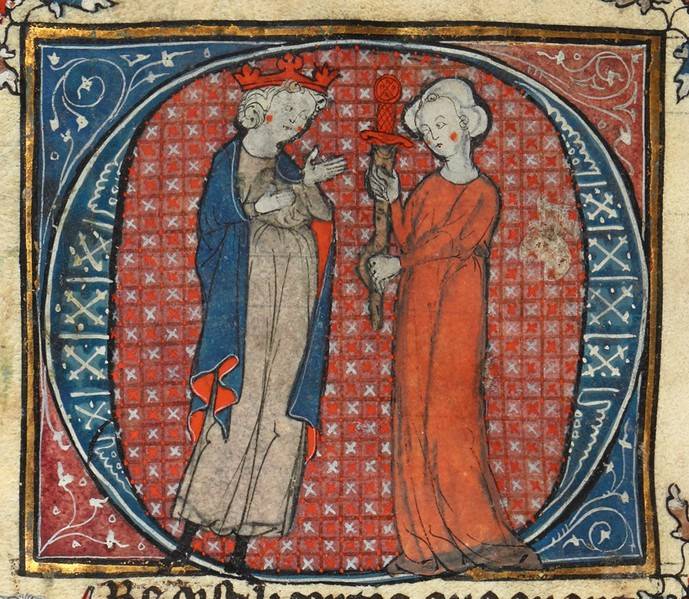
Fata Morgana presents Arthur with a false Excalibur, illustration for the novel "Merlin" (included in the cycle "Vulgate"), XIV century.
However, it was she who, having come to the field of the last battle of Arthur, took the mortally wounded king to the island of Avalon.
By the way, the English Queen Elizabeth Woodville and King Richard the Lionheart were considered descendants of Morgana's niece - the fairy Melusine. After the fall of Accra in 1191, Richard ordered the killing of 2700 prisoners for whom no ransom was paid. In response to the murmur that arose, he said to his fellow crusaders: they say, what did you expect from me, "aren't we (Plantagenets) children of the devil"?
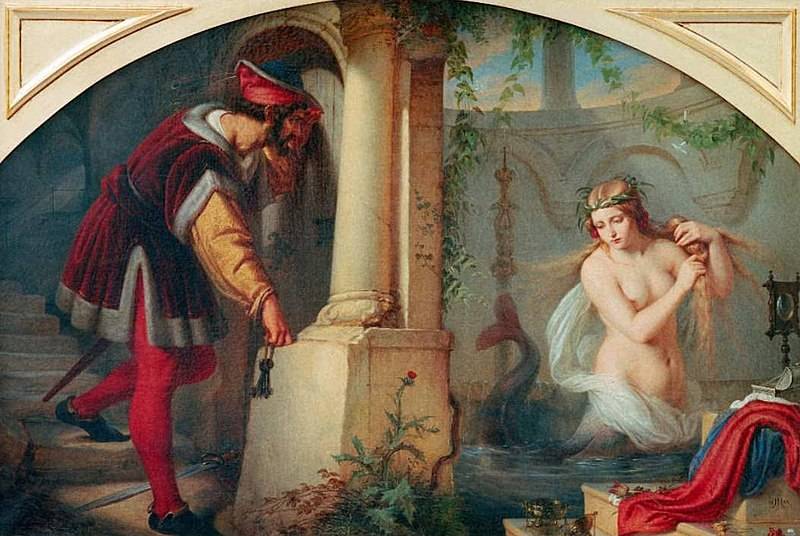
Julius Hubner. Melusine
But that is another story. If you are interested in it, open the article “Good King Richard, Bad King John. Part 1".
"Virgin of the Lake"
Another student of Merlin was Lancelot's teacher - the fairy Vivien, who is sometimes called Nimue, Ninev, and also Lady of the Lake (Lady or Maiden of the Lake). W. Scott and A. Tennyson, G. Rossini, G. Donizetti and F. Schubert turned to her image.
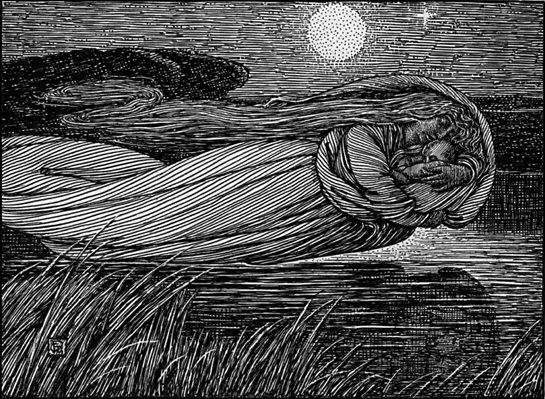
"The Virgin of the Lake and Baby Lancelot", illustration to the poem by A. Tennyson "Lancelot and Elaine" (part of the cycle "Idylls of the King")

Vivienne finds Lancelot to heal him of the madness caused by Guenever's dream of infidelity (this dream was sent by Morgana). Illustration of the Vulgate, 1475
Few people know that the famous Schubert melody, on which the Ave Maria prayer is laid, was written as Ellens Gesang III - the 3rd song of Elaine, the heroine of Walter Scott's poem "The Lady of the Lake".
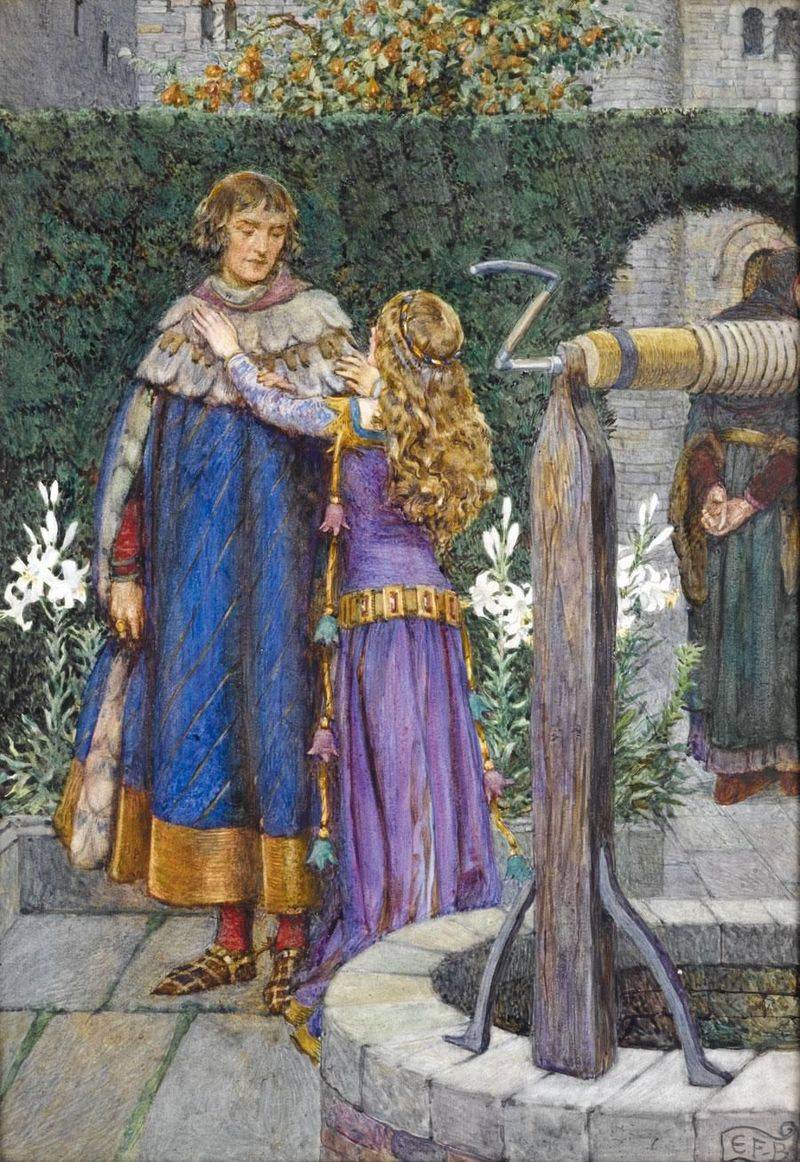
Eleanor Fortescue-Brickdale. Elaine and Lancelot, 1911
Let's say a few words about this girl. This is the daughter of King Pelléas, a descendant of the half-brother of Joseph of Arimathea. With the help of deception, she conceived from Lancelot a son - Galahad, who was destined to find the Grail, and then died of unrequited love for this knight. She bequeathed to lower her body in a funeral barge down the river to the castle of King Arthur.
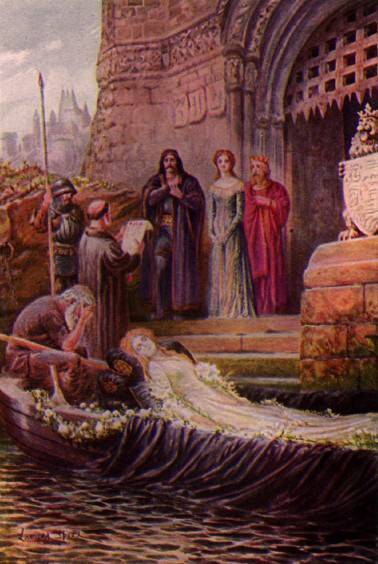
Lancelot Speed. Elaine in the barge
Let's go back to the Lady of the Lake. Vivienne-Nineve was a local native - born in Broceliande, sometimes she is called the daughter of the knight Dionas Briosk and the niece of the Duke of Burgundy. Often the image of this fairy is divided into two: the positive Lady of the Lake, the giver of Excalibur, and the negative Vivienne, who imprisoned Merlin in love with her in the rock. Malorie claims that she did it because of the constant harassment and harassment of an old magician whom she did not love. In the XNUMXth century poem "The Prophecy of Ambrose Merlin of the Seven Kings", it is argued that Vivien was proud that Merlin could not deprive her of her virginity - unlike many other students (such an overt and cynical "harassment" flourished then in Broseliand). In "The Novel of Lancelot" (from the cycle "Vulgate") this is explained by the spell that she put on her womb.
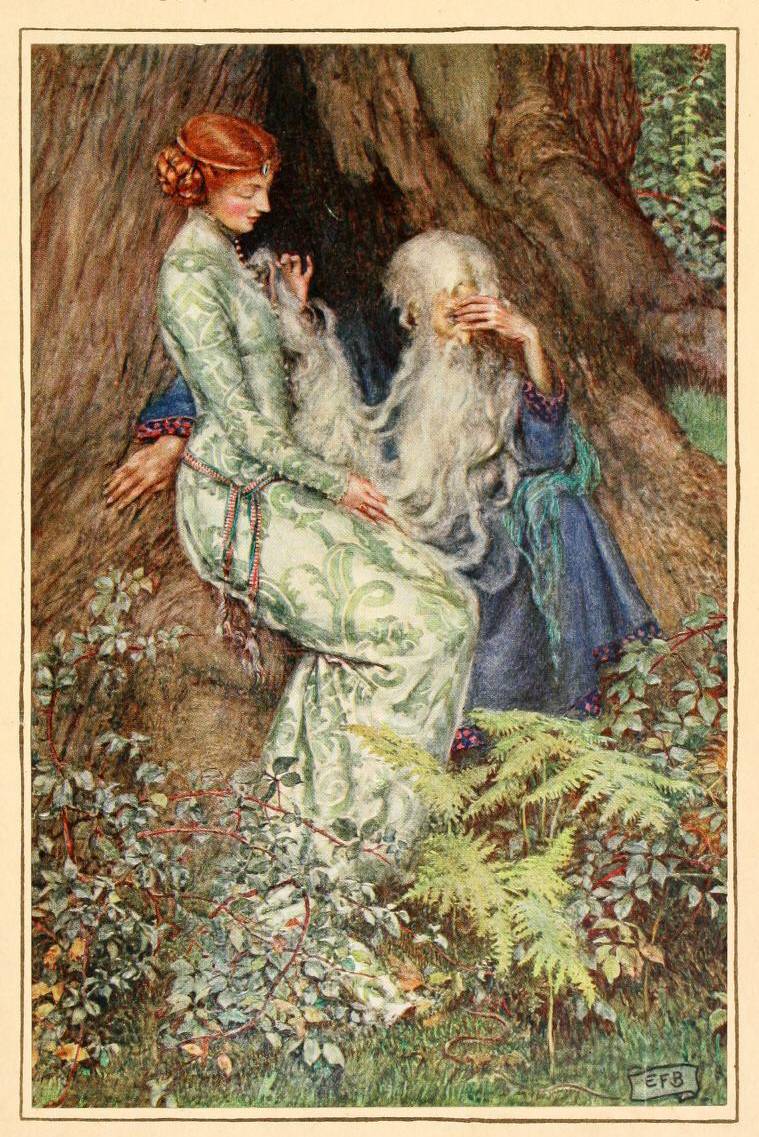
Eleanor Brickdale. "Vivienne and Merlin"
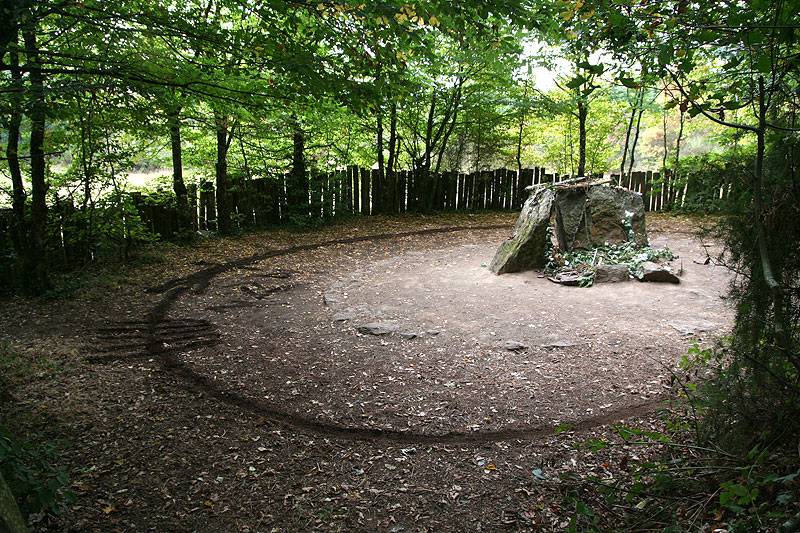
"Merlin's Tomb" in Broceliande Forest
Interestingly, in some legends, having got rid of Merlin, Ninue-Vivienne takes his place as an adviser to King Arthur and twice saves him from the assassination attempts of Morgana. She also rescued him from the captivity of the overly loving sorceress Annour. In general, a very skilled fairy, a worthy student of the lustful Merlin. Together with Morgana, Vivienne takes the mortally wounded Arthur to Avallon.
But back to Celtic legends and their impact on world literature.
The famous French novella Tristan and Isolde, which dates back to the XNUMXth-XNUMXth centuries, is also a literary adaptation of Irish and Welsh legends. Most researchers consider the Irish story ("saga") "The Pursuit of Diarmaid and Graine" to be the primary source of this work.
The Great Hoax by James McPherson
And in 1760, reading Europe was shocked by the anonymously published in Edinburgh "Fragments of Old Poems Collected in the Highlands of Scotland and Translated from the Gaelic Language" (15 passages). The success was such that in the same year the collection was printed again. The translator was the Scottish writer James Macpherson, who then in 1761-1762. in London published a new book - "Fingal, an ancient epic poem in six books, along with several other poems of Ossian, son of Fingal."
Ossian (Oisin) is the hero of many Irish sagas who lived in the XNUMXrd century AD. e. The circumstances of his birth are described in the above-mentioned Irish story "The Pursuit of Diarmaid and Graine". Tradition claims that he lived to see Patrick, the future patron saint of the island, arrived in Ireland.
In new poems, Ossian talked about the exploits of his father - Finn (Fingal) McCumhill and his Fenian warriors (Fians).
And in 1763 MacPherson published the collection "Temora".
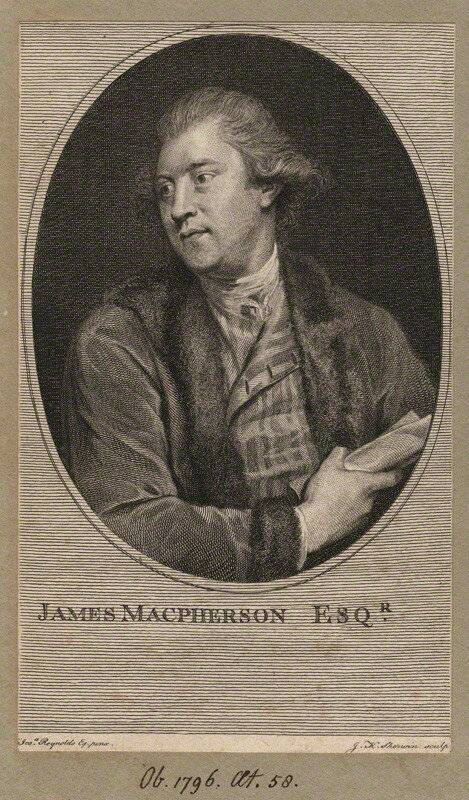
James McPherson
These publications aroused great interest, Celtic history and Celtic legends became fashionable, which was reflected in the work of many poets and writers of those years. Byron and Walter Scott became Ossian's fans. Goethe said through the mouth of Werther:
Napoleon Bonaparte in all his campaigns took the Italian translation of "Ossian's poems" made by Cesarotti. Russian generals Kutaisov and Ermolov "read Fingal" on the eve of the Borodino battle.
In Russia, Ossian's poems were translated (from French) by Dmitriev, Kostrov, Zhukovsky and Karamzin. In imitation of Ossian, Baratynsky, Pushkin and Lermontov wrote poems.
Alas, in the 1914th and early XNUMXth centuries it was proved that the "Works of Ossian" and "Temora" are stylizations that belonged to the pen of MacPherson himself. Only a few fragments are recognized as borrowings from Gaelic folklore. But it was too late: there were already works inspired by this literary hoax, and some of them turned out to be very successful. In XNUMX the Russian poet O. Mandelstam dedicated the following lines of his poem to Macpherson and Ossian:
Have not tried old wine -
Why am I dreaming of a clearing
Scotland's blood moon?
And the roll call of the raven and the harp
It seems to me in an ominous silence
And blown up by the wind scarves
Druzhinnikov flash by the moon!
I got a blissful inheritance -
Alien singers wandering dreams;
Its kinship and boring neighborhood
We are deliberately free to despise.
And not one treasure, perhaps
Passing grandchildren, great-grandchildren will leave.
And again the skald will add another song
And how he will pronounce it. "
The next article will talk about the Grail and the search for this relic.
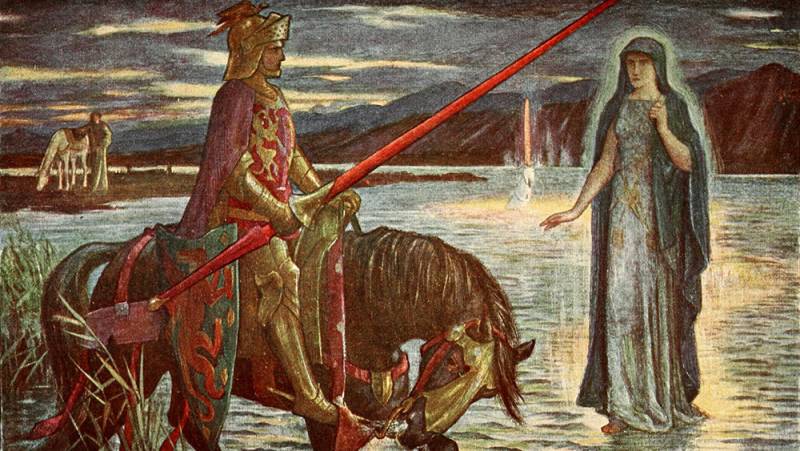
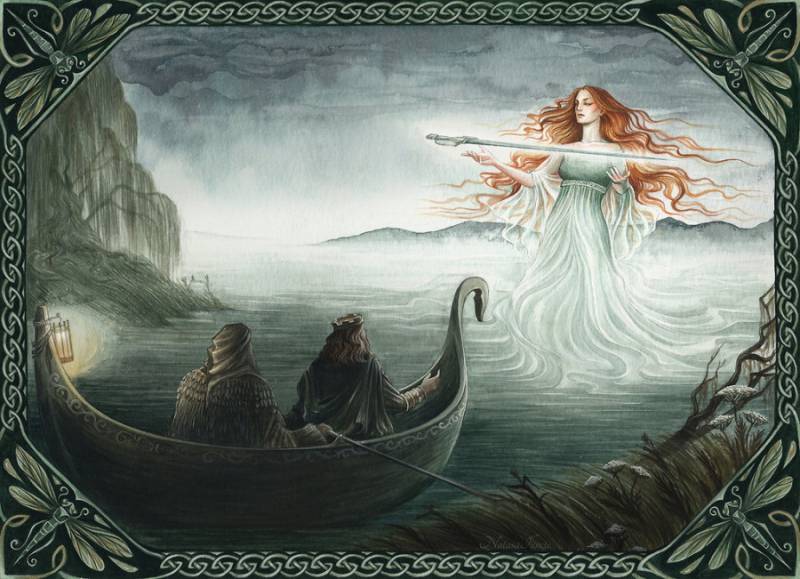
Information